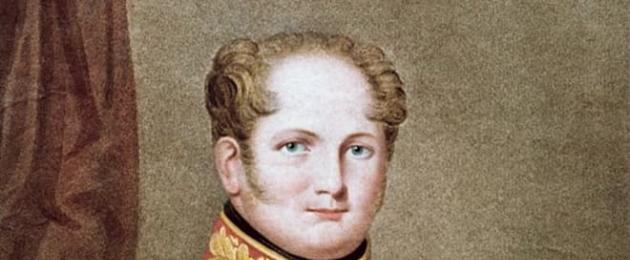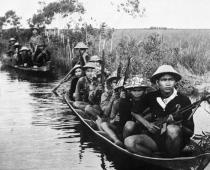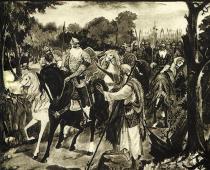Name: Alexander I (Alexander Pavlovich Romanov)
Date of Birth: December 23, 1777
Age: 47 years old
Date of death: December 1, 1825
Place of Birth: St. Petersburg
Activity: Emperor and Autocrat of All Russia
Family status: was married
Alexander I: biography
Emperor Alexander I Pavlovich, sometimes erroneously referred to as Tsar Alexander I, ascended the throne in 1801 and ruled for almost a quarter of a century. Russia under Alexander I waged successful wars against Turkey, Persia and Sweden, and later became embroiled in the war of 1812 when Napoleon attacked the country. During the reign of Alexander I, the territory expanded due to the annexation of Eastern Georgia, Finland, Bessarabia and part of Poland. For all the transformations introduced by Alexander I, he was called Alexander the Blessed.
 | Power today
| Power today The biography of Alexander I was originally supposed to be outstanding. Not only was he the eldest son of the emperor and his wife Maria Feodorovna, but the grandmother did not have a soul in her grandson. It was she who gave the boy a sonorous name in honor and, in the hope that Alexander would create history following the example of the legendary namesakes. It is worth noting that the name itself was unusual for the Romanovs, and only after the reign of Alexander I did it firmly enter the family name book.
 | Arguments and Facts
| Arguments and Facts The personality of Alexander I was formed under the tireless supervision of Catherine the Great. The fact is that the empress initially considered the son of Paul I incapable of taking the throne and wanted to crown her grandson “over the head” of her father. The grandmother tried to ensure that the boy almost did not communicate with his parents, however, Pavel had influence on his son and he took over his love for military science from him. The young heir grew up affectionate, intelligent, easily acquired new knowledge, but at the same time he was very lazy and proud, which is why Alexander I did not manage to learn how to focus on painstaking and lengthy work.
 | Wikipedia
| Wikipedia Contemporaries of Alexander I noted that he had a very lively mind, incredible insight and was easily carried away by everything new. But since two opposite natures, grandmother and father, actively influenced him from childhood, the child was forced to learn to please absolutely everyone, which became the main characteristic of Alexander I. Even Napoleon called him an “actor” in a good sense, and Alexander Sergeevich Pushkin wrote about Emperor Alexander "in the face and life of a harlequin."
 | Runiverse
| Runiverse Fascinated by military affairs, the future Emperor Alexander I served in active service in the Gatchina troops, which were personally formed by his father. The result of the service was the deafness of the left ear, but this did not prevent Paul I from making his son a colonel of the guard when he was only 19 years old. A year later, the son of the ruler became the military governor of St. Petersburg and headed the Semenovsky Guards Regiment, then Alexander I briefly presided over the military parliament, after which he began to sit in the Senate.
Reign of Alexander I
Emperor Alexander I ascended the throne immediately after the violent death of his father. A number of facts confirm that he was aware of the plans of the conspirators to overthrow Paul I, although he may not have suspected regicide. It was the new head of the Russian Empire who announced the "apoplexy" that struck his father, literally a few minutes after his death. In September 1801, Alexander I was crowned.
 Ascension of Emperor Alexander to the throne | Runiverse
Ascension of Emperor Alexander to the throne | Runiverse The very first decrees of Alexander I showed that he intended to eradicate judicial arbitrariness in the state and introduce strict legality. Today it seems incredible, but at that time there were practically no strict fundamental laws in Russia. Together with his closest associates, the emperor formed a secret committee with which he discussed all plans for state reform. This community was called the Committee of Public Salvation, and is also known as the Public Movement of Alexander I.
Reforms of Alexander I
Immediately after Alexander I came to power, the transformations became visible to the naked eye. His reign is usually divided into two parts: at first, the reforms of Alexander I occupied all his time and thoughts, but after 1815 the emperor became disillusioned with them and began a reactionary movement, that is, on the contrary, clamped people in a vise. One of the most important reforms was the creation of the "Indispensable Council", which was later transformed into the State Council with several departments. The next step is the creation of ministries. If earlier decisions on any issues were taken by majority vote, now a separate minister was responsible for each industry, who regularly reported to the head of state.
 Reformer Alexander I | Russian history
Reformer Alexander I | Russian history The reforms of Alexander I also touched upon the peasant question, at least on paper. The emperor thought about the abolition of serfdom, but he wanted to do it gradually, but he could not determine the steps for such a slow emancipation. As a result, the decrees of Alexander I on "free cultivators" and the ban on the sale of peasants without the land on which they live turned out to be a drop in the ocean. But Alexander's transformations in the field of education became more significant. By his order, a clear gradation of educational institutions was created according to the level of the educational program: parish and district schools, provincial schools and gymnasiums, and universities. Thanks to the activities of Alexander I, the Academy of Sciences was restored in St. Petersburg, the famous Tsarskoye Selo Lyceum was created, and five new universities were founded.
 Tsarskoye Selo Lyceum founded by Emperor Alexander I | All-Russian Museum of A.S. Pushkin
Tsarskoye Selo Lyceum founded by Emperor Alexander I | All-Russian Museum of A.S. Pushkin But the sovereign's naive plans for the rapid transformation of the country ran into opposition from the nobles. He could not quickly implement his reforms because of the fear of a palace coup, plus the attention of Alexander 1 of the war was occupied. Therefore, despite good intentions and the desire for reform, the emperor could not bring all his desires to life. In fact, in addition to educational and state reform, only the Polish constitution is of interest, which the ruler's associates considered as a prototype for the future Constitution of the entire Russian Empire. But the turn of Alexander I's domestic policy towards reaction buried all the hopes of the liberal nobility.
Politics of Alexander I
The starting point for a change of opinion about the need for reform was the war with Napoleon. The emperor realized that in the conditions that he wanted to create, a quick mobilization of the army was impossible. Therefore, Emperor Alexander 1 shifts politics from liberal ideas to the interests of state security. A new reform is being developed, which turned out to be the most accustomed: military reforms.
 Portrait of Alexander I | Runiverse
Portrait of Alexander I | Runiverse With the help of the Minister of War, a project is being created for a completely new type of life - a military settlement, which was a new estate. Without much burdening the country's budget, it was supposed to maintain and equip a standing army with a strength at the wartime level. The growth in the number of such military districts continued throughout the years of the reign of Alexander I. Moreover, they were preserved under the successor Nicholas I and were abolished only by the emperor.
Wars of Alexander I
In fact, the foreign policy of Alexander I was reduced to a series of constant wars, thanks to which the country's territory increased significantly. After the end of the war with Persia, Russia of Alexander I received military control in the Caspian Sea, and also expanded its possessions by annexing Georgia. After the Russian-Turkish war, Bessarabia and all the states of Transcaucasia replenished the possessions of the Empire, and after the conflict with Sweden, Finland. In addition, Alexander I fought with England, Austria and started the Caucasian War, which did not end during his lifetime.
 Portrait of Alexander I | Dnevno
Portrait of Alexander I | Dnevno The main military adversary of Russia under Emperor Alexander I was France. Their first armed conflict took place as early as 1805, which, despite periodic peace agreements, constantly flared up again. Finally, inspired by his fantastic victories, Napoleon Bonaparte sent troops into the territory of Russia. The Patriotic War of 1812 began. After the victory, Alexander I concluded an alliance with England, Prussia and Austria and made a number of foreign campaigns, during which he defeated Napoleon's army and forced him to abdicate. After that, the Kingdom of Poland also went to Russia.
When the French army ended up on the territory of the Russian Empire, Alexander I declared himself commander-in-chief and forbade peace negotiations until at least one enemy soldier remained on Russian soil. But the numerical advantage of Napoleon's army was so great that the Russian troops constantly retreated inland. Soon the emperor agrees that his presence interferes with the military leaders, and leaves for St. Petersburg. Mikhail Kutuzov becomes the commander-in-chief, who was very respected by soldiers and officers, but most importantly, this man has already proved himself to be an excellent strategist.
 Painting "Kutuzov on the Borodino field", 1952. Artist S. Gerasimov | Mind mapping
Painting "Kutuzov on the Borodino field", 1952. Artist S. Gerasimov | Mind mapping And in the Patriotic War of 1812, Kutuzov again showed his sharp mind as a military tactician. He outlined a decisive battle near the village of Borodino and positioned the army so well that it was covered by natural relief from two flanks, and in the center the commander-in-chief placed artillery. The battle was desperate and bloody, with huge losses on both sides. The battle of Borodino is considered a historical paradox: both armies declared their victory in the battle.
 The painting "Napoleon's Retreat from Moscow", 1851. Artist Adolf Nortern | Chrontime
The painting "Napoleon's Retreat from Moscow", 1851. Artist Adolf Nortern | Chrontime To keep his troops on alert, Mikhail Kutuzov decides to leave Moscow. The result was the burning of the former capital and its occupation by the French, but Napoleon's victory in this case turned out to be Pirova. In order to feed his army, he was forced to move to Kaluga, where he had already concentrated the forces of Kutuzov and did not let the enemy go further. Moreover, partisan detachments delivered effective blows to the invaders. Deprived of food and unprepared for the Russian winter, the French began to retreat. The final battle near the Berezina River put an end to the defeat, and Alexander I issued a Manifesto on the victorious end of the Patriotic War.
Personal life
In his youth, Alexander was very friendly with his sister Ekaterina Pavlovna. Some sources even hinted at a relationship more than just brother and sister. But these conjectures are very unlikely, since Catherine was 11 years younger, and at the age of 16, Alexander I had already connected his personal life with his wife. He married a German woman, Louise Maria Augusta, who, after the adoption of Orthodoxy, became Elizaveta Alekseevna. They had two daughters, Maria and Elizabeth, but both died at the age of one, so it was not the children of Alexander I who became the heir to the throne, but his younger brother Nicholas I.
 | TVNZ
| TVNZ Due to the fact that his wife could not give him a son, the emperor's relationship with his wife cooled greatly. He practically did not hide his love relationships on the side. At first, Alexander I cohabited for almost 15 years with Maria Naryshkina, the wife of Chief Jägermeister Dmitry Naryshkin, whom all the courtiers called in his eyes "an exemplary cuckold." Maria gave birth to six children, and the paternity of five of them is usually attributed to Alexander. However, most of these children died in infancy. Also, Alexander I had an affair with the daughter of the court banker Sophie Velho and with Sophia Vsevolozhskaya, who gave birth to his illegitimate son, Nikolai Lukash, a general and war hero.
 | Wikipedia
| Wikipedia In 1812, Alexander I became interested in reading the Bible, although before that he was basically indifferent to religion. But he, like his best friend Alexander Golitsyn, was not satisfied with the framework of Orthodoxy alone. The emperor was in correspondence with Protestant preachers, studied mysticism and various currents of the Christian faith, and sought to unite all denominations in the name of "universal truth." Russia under Alexander I became more tolerant than ever before. The official church was outraged by such a turn and began a secret behind-the-scenes fight against the like-minded emperor, including Golitsyn. The victory remained with the church, which did not want to lose power over the people.
Emperor Alexander I died at the beginning of December 1825 in Taganrog, during the next trip, which he loved very much. The official cause of death of Alexander I was fever and inflammation of the brain. The sudden death of the ruler caused a wave of rumors, spurred on by the fact that shortly before that, Emperor Alexander had drawn up a manifesto in which he transferred the right of succession to his younger brother Nikolai Pavlovich.
 Death of Emperor Alexander I | Russian Historical Library
Death of Emperor Alexander I | Russian Historical Library People began to say that the emperor faked his death and became a hermit Fyodor Kuzmich. Such a legend was very popular during the lifetime of this really existing old man, and in the 19th century it received additional arguments. The fact is that it was possible to compare the handwriting of Alexander I and Fyodor Kuzmich, which turned out to be almost identical. Moreover, today genetic scientists have a real project to compare the DNA of these two people, but so far this examination has not been carried out.
- In contact with 0
- Google Plus 0
- OK 0
- Facebook 0








